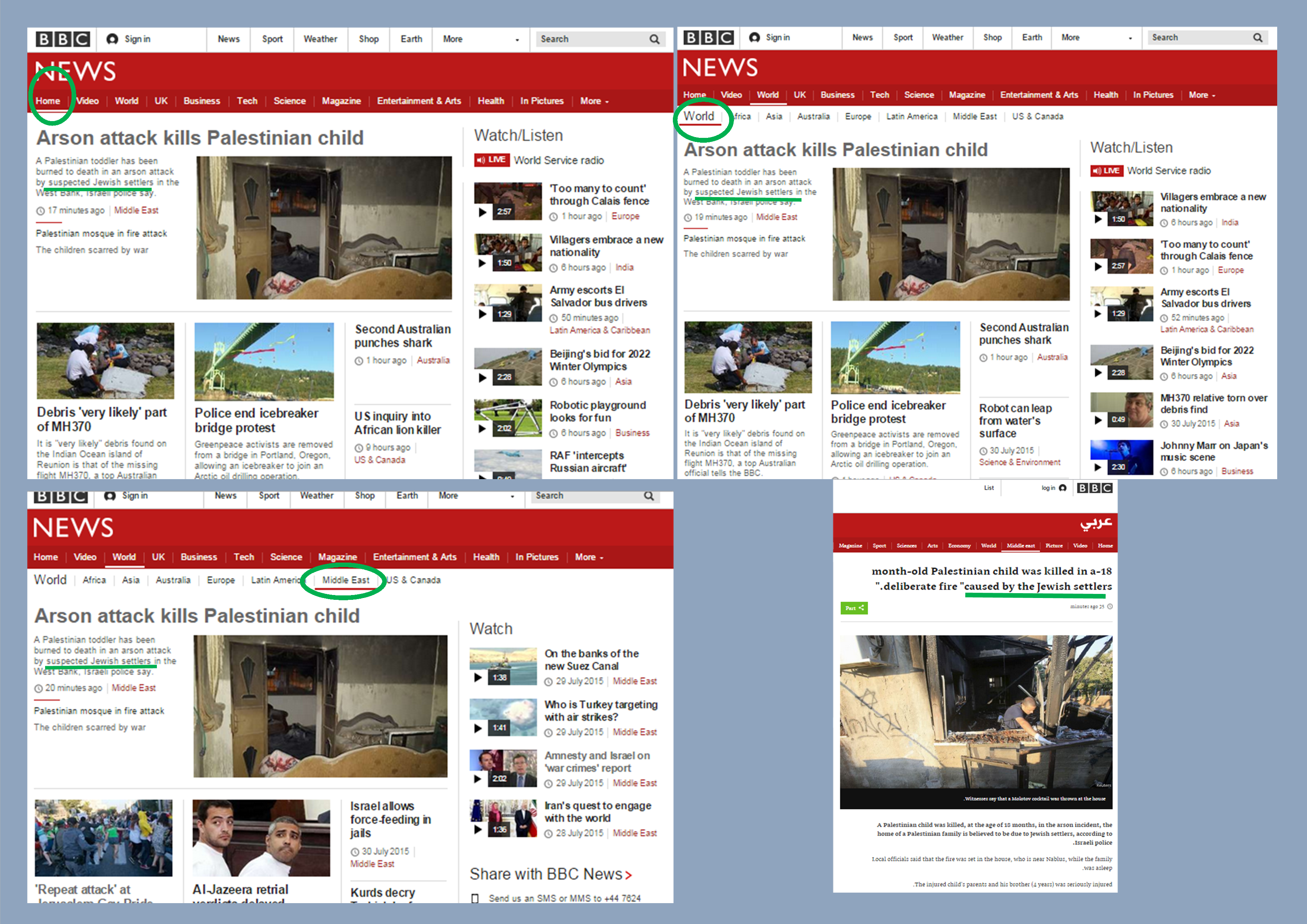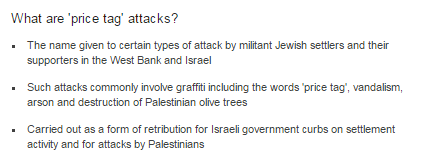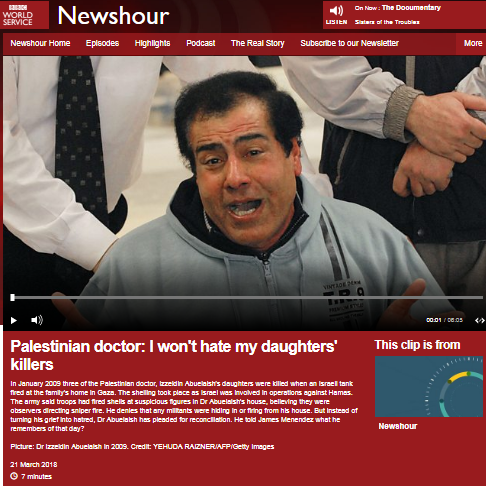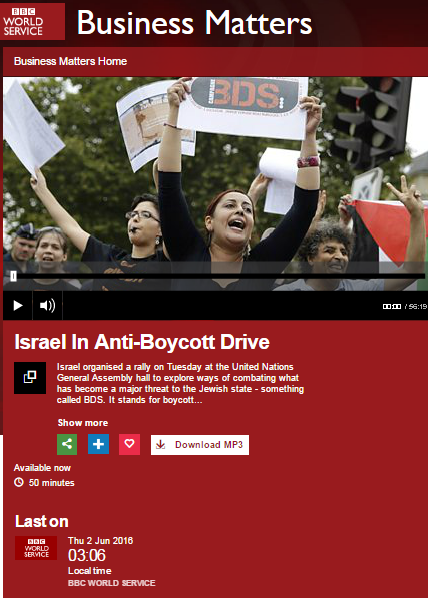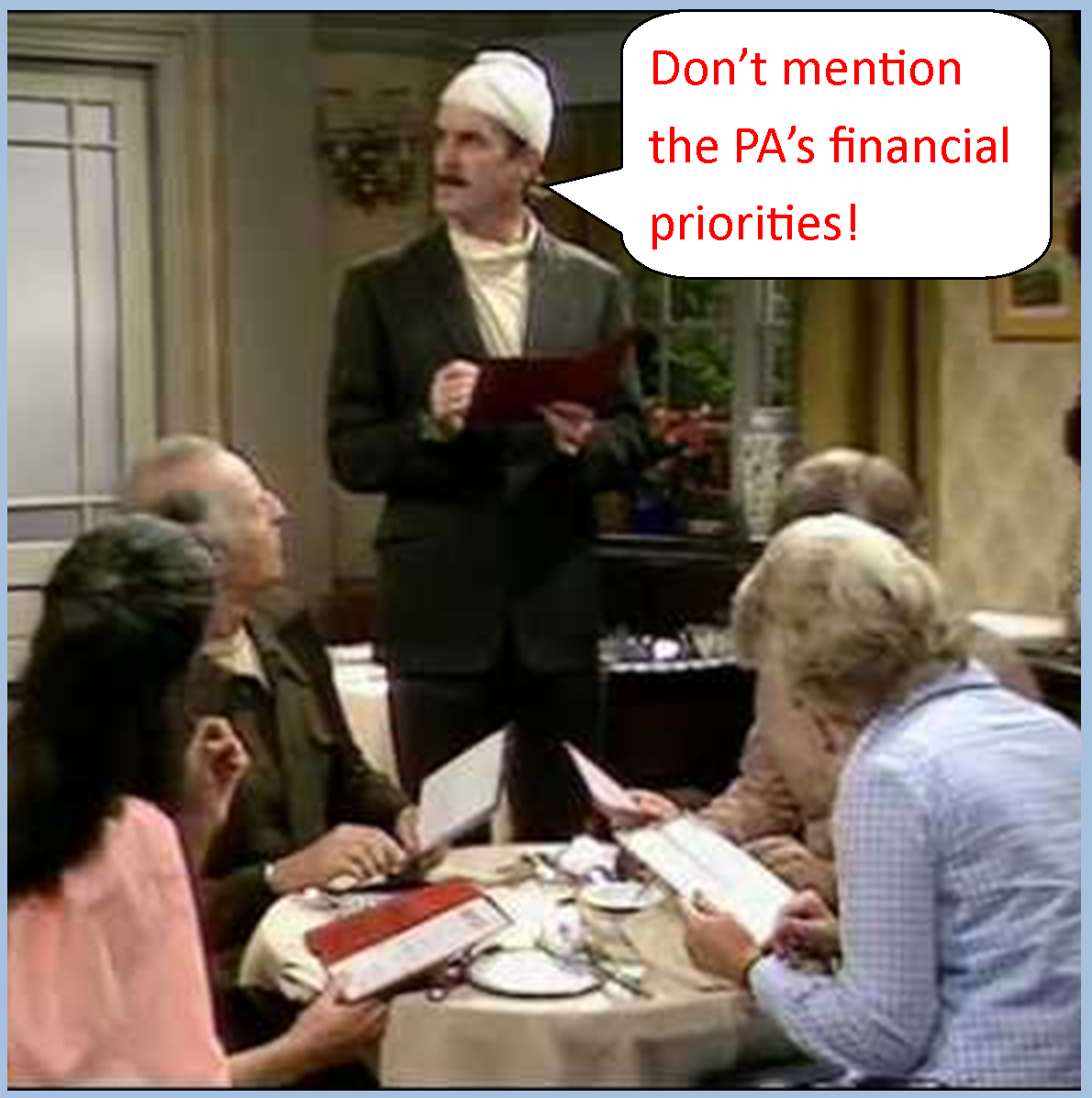Five days on from the shocking terror attack in Duma in which toddler Ali Dawabsha was murdered and members of his family injured, there has to date been no official publication of information relating to the arrest of suspected perpetrators of the arson attack.
The BBC News website’s coverage of that story as it broke prompts several observations on the topics of consistency and contradiction.
On the morning of July 31st an initial written report – titled “Palestinian fury as ‘Jewish settler’ arson attack kills child” – was the main story posted on the BBC News website’s homepage, its ‘World’ page and its Middle East page. A report also appeared on the BBC Arabic website.
We have been unable to find documented support for the claim in the subheadings appearing on those webpages according to which the term “suspected Jewish settlers” was used by the Israeli police. The Guardian and Ynet were among many media outlets reporting different terminology: “Police described it as a “suspected attack with nationalist motives””.
In contrast to the extensive promotion of this story on three web pages, the three separate fatal terror attacks on Israelis which took place in April and June 2015 did not receive any English language BBC coverage whatsoever.
That article opens with the following words:
“Palestinian officials say Israel is “fully responsible” for the death of an infant in an arson attack blamed on Jewish settlers in the West Bank.” [emphasis added]
In relation to the graffiti found at the scene of the attack, readers are later informed that:
“While it is unclear what the word “revenge” referred to, the incident resembles what have become known as “price tag” attacks.
Such attacks usually involve acts of vandalism or arson by Jewish extremists as retribution for actions taken by the Israeli government against Jewish settlements or unauthorised outposts in the West Bank, or for violence by Palestinians.”
The report also includes an insert titled “What are ‘price tag’ attacks?”.
No attempt is made to provide readers with the relevant context pertaining to the estimated number of people involved in such attacks and it is not clarified that the overwhelming majority of those whom the BBC would describe as “Jewish settlers” abhor and condemn that criminal activity.
That same insert and preceding text also appeared in the BBC News website’s follow-up report on the same subject – headlined “West Bank arson: Israel ‘will catch Palestinian child’s killers’” – published later in the day. Again, no context was provided.
That article’s opening lines state:
“Israel has vowed to catch arsonists, suspected to be Jewish settlers, who killed a Palestinian infant in a firebomb attack on a West Bank village.” [emphasis added]
A filmed report for BBC television news programmes which appeared on the BBC News website on July 31st under the title “West Bank toddler death: Palestinian and Israeli reaction” claimed in its synopsis that:
“Israeli police say Jewish settlers are suspected of carrying out the attack on two Palestinian houses in the village of Duma.” [emphasis added]
In that report audiences heard Mahmoud Abbas make the following claims:
“This crime is added to other crimes committed by the settlers. And frankly speaking they are crimes committed by the Israeli government when it encourages settlements and illegal construction everywhere in the West Bank and Jerusalem. It is the Israeli government that encourages these settlers to carry out their deeds on a daily basis.” [emphasis added]
Another synopsis to an additional filmed report for BBC television news which was posted on the website on the same day under the title “Palestinian toddler dies in arson attack” told audiences that: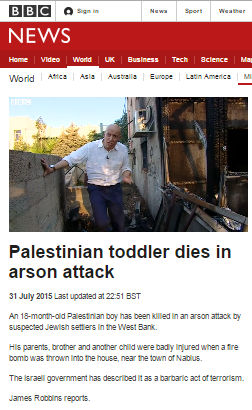
“An 18-month-old Palestinian boy has been killed in an arson attack by suspected Jewish settlers in the West Bank.” [emphasis added]
In that report James Robbins told viewers:
“This was almost certainly a political killing. This graffiti and the attacks that go with them are known as price tags. They are a message from extreme nationalists to the Israeli government. The nationalists are saying there’s a price to pay for the government’s refusal to expand Israeli settlements on Palestinian territory.”
Confusingly for BBC audiences, just one day earlier the World Service’s James Menendez had told them that the Israeli government was doing exactly that:
“You can look at the map and you can see settlements that have sprung up over the last few years all over the West Bank.”
Robbins also told viewers that: [emphasis added]
“They [Palestinians] say that Israeli government policy has encouraged settler violence.”
Saeb Erekat was then seen claiming that the attack in Duma “reflects the culture of hate and incitement that exists and nourished by the Israeli government.”
Notably, the BBC consistently avoids coverage of the topic of Palestinian incitement and glorification of terrorism.
Both the written articles end with the following words, which include the BBC’s problematic standard insert on ‘international law’: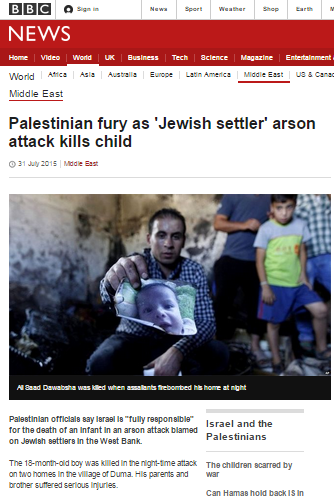
“Palestinians regard settlements as a major obstacle to building a sought-after state in contiguous territory in the West Bank and East Jerusalem.
About 500,000 Jews live in more than 100 settlements built since Israel’s 1967 occupation of the West Bank and East Jerusalem. The settlements are considered illegal under international law, though Israel disputes this.”
Until the Israeli security services announce that arrests have been made relating to this case there is of course no way of knowing whether the speculations widely promoted by the BBC (and to be fair, additional media organisations) concerning the identity of the perpetrators are in fact accurate. Nevertheless, it is notable that BBC reporting on Palestinian terror suspects rarely, if ever, specifies the subject’s religion and clearly BBC audiences would have been no less informed had the phrase ‘Israeli extremists’ been used instead of “Jewish settlers”.
In the meantime, the fact that the corporation has refrained from clarifying to its audiences the all-important context of the scale of the small group of extremists behind previous so-called ‘price tag’ attacks is contributing to the stereotyping of half a million people whom it also lumps into the homogeneous category of “Jewish settlers”. Notably, there was no BBC News website coverage of the coexistence rally held on August 2nd in Gush Etzion in response to the terror attack in Duma.
In 2013 the BBC’s political editor Nick Robinson publicly apologized for using a quote including the words “of Muslim appearance” in a report related to the murder of Lee Rigby. His blogpost included the following observations:
“That phrase “of Muslim appearance” clearly offended some who demanded to know what it could possibly mean. Others were concerned that it was a racist generalisation. […]
…I’m sorry for using a phrase that, on reflection, was both liable to be misinterpreted and to cause offence. Many Muslims were quick to condemn the attack and to distance themselves and their religion from the brutal savagery seen on the streets of Woolwich.
The overnight protests of the English Defence League and attacks on some mosques lead some to fear the consequences for community relations. This all makes people understandably sensitive about anything which could be used to justify hostility to people on the basis of their appearance or religion.”
Whatever one’s opinion of Robinson’s apology, it is obvious that its publication (like the similar sensitivity to members of Paris’ Muslim community shown in BBC coverage of the January 2015 terror attacks) reflects an approach which is very different to the one indicated by the extensive use of the broad-brush term “Jewish settlers” in the four reports above.
That lack of consistency in BBC policy clearly warrants discussion.

